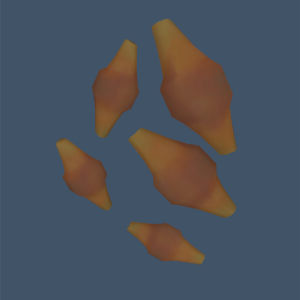Nitrogenase
Performs Anaerobic Nitrogen Fixation to produce Ammonia ![]() from gaseous Nitrogen
from gaseous Nitrogen ![]() and ATP
and ATP ![]() , producing one of the components of growth for cellular reproduction. Less efficient than the eukaryotic Nitrogen-Fixing Plastid.
, producing one of the components of growth for cellular reproduction. Less efficient than the eukaryotic Nitrogen-Fixing Plastid.
Also performs some Glycolysis to produce ATP ![]() from Glucose
from Glucose ![]() .
.
Requirements
If organelle upgrades are enabled in game settings, the following condition must be true for the player cell:
- Is in a patch with at most 13 Ammonia
 .
.
Processes
Anaerobic Nitrogen Fixation: ATP ![]() + Nitrogen
+ Nitrogen ![]() → Ammonia
→ Ammonia ![]()
Fixes atmospheric Nitrogen ![]() into Ammonia
into Ammonia ![]() by expending energy. Rate scales with the amount of environmental Nitrogen
by expending energy. Rate scales with the amount of environmental Nitrogen ![]() . Less efficient than the equivalent process in the Nitrogen-Fixing Plastid.
. Less efficient than the equivalent process in the Nitrogen-Fixing Plastid.
Glycolysis
Like many prokaryotic organelles, the Cytoplasm surrounding Nitrogenase performs a less efficient form of Glycolysis, transforming Glucose ![]() into ATP
into ATP ![]() .
.
Modifications
No modifications.
Effects
No effects.
Upgrades
No upgrades.
Strategy
The Ammonia ![]() produced by Nitrogenase contributes towards stored resources for reproduction. Cells with Nitrogenase therefore need only find Phosphate
produced by Nitrogenase contributes towards stored resources for reproduction. Cells with Nitrogenase therefore need only find Phosphate ![]() from the environment to reproduce at a faster rate than the base rate (the base rate is zero if passive reproduction progress is disabled in options for the current game).
from the environment to reproduce at a faster rate than the base rate (the base rate is zero if passive reproduction progress is disabled in options for the current game).
Since Anaerobic Nitrogen Fixing consumes ATP ![]() , you should have excess ATP
, you should have excess ATP ![]() available before adding this organelle to your cell. The small amount of Glycolysis performed by Nitrogenase is not enough to offset its own osmoregulation cost.
available before adding this organelle to your cell. The small amount of Glycolysis performed by Nitrogenase is not enough to offset its own osmoregulation cost.
Scientific Background
TBA

